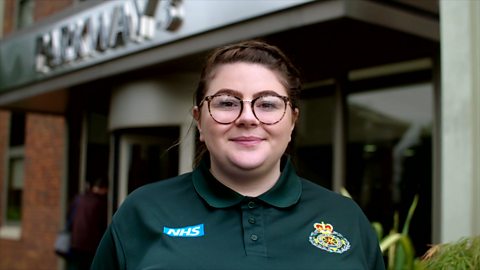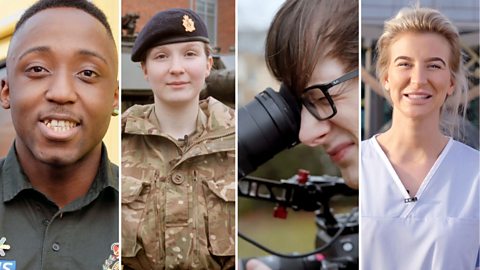Meet Jocelin, 30, from London. She is a newborn hearing screener at Evelina Hospital in London.
Part of our Bitesize world of work series.
The mums and dads are just so grateful. They say "thank you for screening my child's ear."
Hi, I'm Jocelin and I'm a newborn hearing screener.
Jocelin:
(to mother of the baby) I'm just placing the soft tip into baby's ears and I'm looking for a response from the ear.
I identify babies with hearing loss. I work in the community or in a hospital.
(to baby) Hello Cooper.
My day-to-day job involves placing a small, soft tip into babies' ears and we're playing some soft clicking sounds and I'm looking for a response. Sometimes, we can have also a second screen where we are looking into the nerve of the ears. If I don't get a clear result in both ears, I refer them to see an audiologist to investigate further.
(to mother of the baby) Great! So mum we've got clear responses from both sides of baby's ears.
Mother of the baby:
Great, brilliant.
Jocelin:
It's such a rewarding thing to know that you're helping identify hearing loss and that can help families in the long run with their speech, their language. The mums and dads are just so grateful. They say "thank you for screening my child's ear."
(to the baby) They're all done, Cooper. You've been so good. Well done. Thank you.
Mother:
Thank you very much.
Jocelin:
I applied for my job because when I was pregnant with my first son, when he was born he had cataracts in his right eye, so it was quite scary and quite daunting for me.
Once that was established, I was like, "wow." There needs to be more people in the industry, in the hospital that can screen babies from the first go. So that made me apply for a job to say that I want to help other families get that diagnosis early on.
The application process was straightforward. I went onto the NHS Jobs website and you put all your details in, your cv and all your qualifications that you have. I have GCSEs Maths, English and Science, and I also have an Access Diploma in Nursing and Midwifery.
Once I got my job as a newborn hearing screener, they offered me a Level 3 Health Screening Diploma, so I can learn on the job. In the future, I would like to do my Level 4 Audiology Diploma and qualify as an audiology assistant.
(to colleague) I'm going to put the green to the green.
Yeah. That's great.
Louise, employer:
Jocelin is very good at handling babies, so work experience in a childcare setting would be very helpful with that.
Jocelin:
Holding small babies is very rewarding. I do love working with families, mothers. I do love talking to people. You know, it's something that I really enjoy.
Louise, employer:
In this job, you need to be able to communicate clearly with parents that could be very vulnerable and feel very concerned.
Jocelin:
I wish that I had known before I applied for the job that it can be quite a sensitive subject for people. Some families don't know about hearing loss or have no history of it, so I wish I'd done more research on hearing loss before I applied.
My top tip for students is to go back and do your research, read some books, talk to other people that work in hospitals if you can. You need to have compassion, you need to be kind, considerate and that's what I love, is to help and give.
- Jocelin screens the hearing of babies from newborn to three months. If she does not get a clear result in both ears after a second screening, she refers the baby to an audiologist to investigate further. Audiologists are hearing specialists. She also tests babies in the community
- Some of the skills Jocelin uses in her job include operating the equipment, knowledge of physiology and communication skills
- At school, Jocelin did a Level 3 Diploma in Childcare. She then completed an Access to Nursing course, hoping to become a midwife
- Her plans had to change after having children. She worked in a nursery for a number of years and then became a maternity support worker
- It was through this job she learnt about different roles in healthcare and applied to become a newborn hearing screener
- In the future, she would like to complete an Audiology Diploma and qualify as an audiology assistant.

Top tips
- Do your research by reading books or talking to other people doing the job
- Be kind, considerate and compassionate when doing the role.

What to expect if you want to be a newborn hearing screener
- Newborn hearing screener average salary: NHS band [3]. Read more about NHS bands. Salaries will differ in private healthcare.
- Newborn hearing screener typical working hours: 38 to 40 hours per week
What qualifications do you need to be a newborn hearing screener?
You could get into this role via a university course, a degree apprenticeship, volunteering or working towards the role.
Sources: LMI for All, NHS Health Careers
This information is a guide and is constantly changing. Please check the NHS Health Careers website for the latest information and all the qualifications needed.
For careers advice in all parts of the UK visit: National Careers Service (England), nidirect (Northern Ireland), My World of Work (Scotland) and Careers Wales (Wales).


The Open University and BBC have been working in partnership for over half a century to provide a unique public service offer covering all four nations of the UK. Each year the OU co-produces a wide range of content for television, audio – radio and Sounds, digital and social with the BBC, including BBC Bitesize.

Careers in healthcare. collection
A collection of stories from people working across the healthcare sector.

Explore healthcare careers with the OU. External Link
THE OPEN UNIVERSITY

More from Bitesize Careers
Hear from young people about the world of work.

